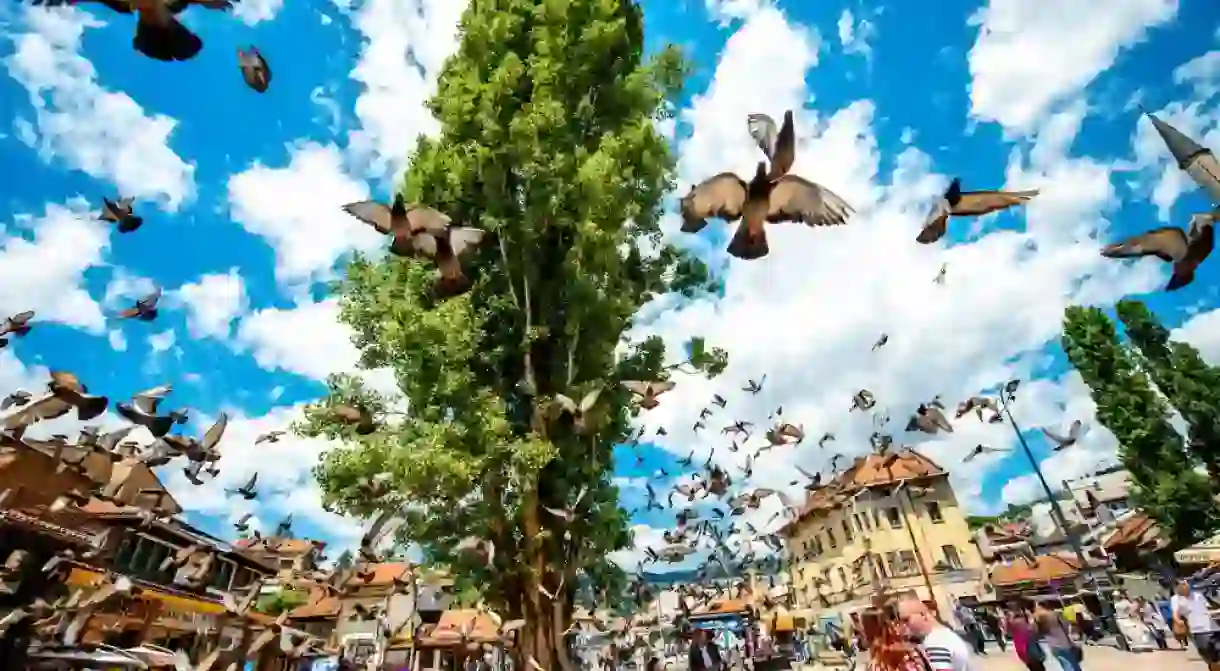21 Essential Phrases You'll Need in Bosnia

Planning to visit Bosnia and want to get away from the touristy areas? You’re going to need a few words and phrases, especially in the less-visited and rural areas. Here are our 21 words and expressions you should write down, learn and be familiar with before starting your Bosnian adventure.
If you’re feeling ready to put your Bosnian language knowledge to use then be sure to book a trip to explore the best of Bosnia.
Greetings
Knowing a few greetings in Bosnian gives you the satisfaction of being different from the other tourists, and the locals appreciate the effort.
Dobar dan (DOH-bahr dahn) or Zdravo (ZDRAH-voh) / Hello
You’ll hear dobar dan in a formal setting or zdravo among friends. Greet someone you don’t know with a polite dobar dan, and say zdravo to those you do.
Hvala (HVAH-lah) / Thank You
Everyone around the world appreciates tourists expressing gratitude in the local language. Use hvala in Bosnia.

Say hvala, and you’ll hear nema na cemu. Recognise this phrase. People will almost always reply with a smile when a foreigner thanks them in Bosnian.
Da (dah) and Ne (neh) / Yes and No
Just like other Slavic languages, the ubiquitous word for ‘yes’ is da. The word for ‘no’ in Bosnian shares similarities with other Slavic languages—ne, rather than the Russian nyet.
Molim (MOH-leem) / Please
If you try to use the local word for ‘please’, you’ll probably get a smile from the person you’re talking to, which tends to be rare in the Bosnian service industry!
Dovidenja (doh-vee-JEH-nyah) or Cao (chaoo) / Goodbye
The first is formal; most just say cao.
Essential Phrases
Knowing a few phrases such as asking if someone speaks English or how to find the toilet are two of the most important things you should know.
Govorite li engleski? (goh-VOH-ree-teh lee ehn-GLEHS-kee) / Do You Speak English?
Don’t assume everyone speaks English. It’s polite to ask in their language rather than in English, which they may not understand. The response may be either yes or da to say they do or a negative ne.
Ne Razumijem (neh rah-ZOO-myehm) / I Don’t Understand
This one will probably come in useful, especially when you’re first trying to learn the phrases.

We all need to use the toilet, and you’ll probably rely on this phrase in the bar, restaurant, shopping mall or bus station.
Treba mi vasa pomoc (TREH-bah mee VASH-ah POH-mohch) / I Need Your Help
It’s always good to know how to ask for help. You never know when you’re going need it.
Treba mi doktor (TREH-bah mee DOHK-tohr) / I Need a Doctor
Again, always vital, just in case. People in rural areas probably won’t speak English.
Pivo (PEE-voh) or Vino (Vee-noh) / Beer or Wine
Knowing how to ask for a beer or glass of wine is important too!
Public Transport
Finding out information on public transport can be a challenge in Bosnia. Online timetables are often outdated and routes change or are cancelled. Your best bet is to learn a few words and phrases to help you get the right information. Either practice the pronunciation or write them down on a piece of paper. Remember, not everyone speaks English outside of Sarajevo and Mostar.
Autobus (ow-TOH-boos) / Bus
You’ll probably rely on the bus to get around Bosnia.
Autobuske stanice? (OW-toh-boos-keh STAH-nee-tseh?) / The Bus Station?
Know how to ask for the bus station as well.
Voz (vohz) / Train
If you do use the train, it can sometimes be difficult to find the station. When you ask a local for the train, he or she may not understand. Instead, use voz.

Sometimes it’s easy to find the one you want by looking at the sign in the window. But, the Republika Srpska uses the Cyrillic Alphabet more, and unless you can read the letters, you’re screwed.
Koliko je sati? (KOH-lee-koh yeh SAH-tee) / What Time?
Pointing to your watch often works, but not every time. Learn how to ask departure times. The ticket officer might point to the schedule or write it down. Knowing this is essential, as the timetable next to the counter could be wrong!
Danas (DAH-nahs) / Today
It’s always a good idea to double check the timetable. If you want to take the bus today, say danas.
Sutra (SOO-trah) / Tomorrow
Want to travel tomorrow? Say sutra.
Jutro (YOO-troh), Popodne (poh-POHD-neh) and Vece (VEH-cheh) / Morning, Afternoon and Evening
Knowing how to say the time of day will also help you find out what time the bus or train is leaving.

Numbers
Knowing a few numbers is useful for ordering food, drinks, pivo and asking for the time. Learning to count up to ten is usually enough.
Nula (NOO-lah) / 0
Jedan (YEH-dahn) / 1
Dva/dvije (dvah/dvyeh) / 2
Tri (tree) / 3
Cetiri (cheh-TEE-ree) / 4
Pet (peht) / 5
Sest (shehst) / 6
Sedam (SEH-dahm) / 7
Osam (OH-sahm) / 8
Devet (DEH-veht) / 9
Deset (DEH-seht) / 10













